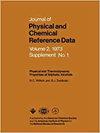Revised Parameters for the IAPWS Formulation for the Ionization Constant of Water Over a Wide Range of Temperatures and Densities, Including Near-Critical Conditions
IF 4.4
2区 工程技术
Q2 CHEMISTRY, MULTIDISCIPLINARY
引用次数: 0
Abstract
The literature database for the ionization constant of water, pKw, has been critically reevaluated to include new accurate flow conductivity data recently reported at near-critical and supercritical conditions. Recently published equations to express the limiting conductivity of fully ionized water were used to correct the conductivity data and yield more accurate pKw values at water densities below 0.6 g cm−3. The ability of the functional forms adopted by the 1980 and 2006 International Association for the Properties of Water and Steam releases to fit the near-critical and supercritical data was tested. Revised parameters for the 2006 “simple” function were derived to improve the accuracy of the model under these conditions. The data fitting procedure made use of estimated standard uncertainties as well as a weighting parameter for each dataset to minimize potential bias due to the very large amount of flow conductivity data now available. Calculations based on the revised formulation were found to be consistent with independent high-temperature data measured using calorimetry and density methods. The revised equation is accurate to within the estimated standard uncertainty limits over the range 0–1000 °C, p = 0–1000 MPa.经修订的 IAPWS 公式参数,用于计算包括近临界状态在内的各种温度和密度范围内的水电离常数
对水的电离常数 pKw 的文献数据库进行了严格的重新评估,以纳入最近报告的近临界和超临界条件下的新的精确流量电导率数据。最近发表的表达完全电离水极限电导率的方程被用来修正电导率数据,并在水密度低于 0.6 g cm-3 时得出更精确的 pKw 值。测试了 1980 年和 2006 年国际水和蒸汽特性协会发布的函数形式对近临界和超临界数据的拟合能力。得出了 2006 年 "简单 "函数的修订参数,以提高模型在这些条件下的准确性。数据拟合程序利用了估算的标准不确定性以及每个数据集的加权参数,以尽量减少由于现有的大量流量传导数据而可能造成的偏差。根据修订后的公式进行的计算与使用量热法和密度法测量的独立高温数据一致。修订后的公式在 0-1000 °C、p = 0-1000 MPa 范围内的准确度在估计的标准不确定性范围内。
本文章由计算机程序翻译,如有差异,请以英文原文为准。
求助全文
约1分钟内获得全文
求助全文
来源期刊
CiteScore
6.90
自引率
11.60%
发文量
14
审稿时长
>12 weeks
期刊介绍:
The Journal of Physical and Chemical Reference Data (JPCRD) is published by AIP Publishing for the U.S. Department of Commerce National Institute of Standards and Technology (NIST). The journal provides critically evaluated physical and chemical property data, fully documented as to the original sources and the criteria used for evaluation, preferably with uncertainty analysis. Critical reviews may also be included if they document a reference database, review the data situation in a field, review reference-quality measurement techniques, or review data evaluation methods.

 求助内容:
求助内容: 应助结果提醒方式:
应助结果提醒方式:


